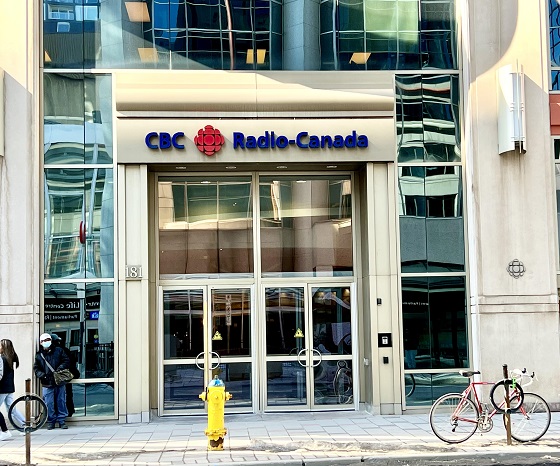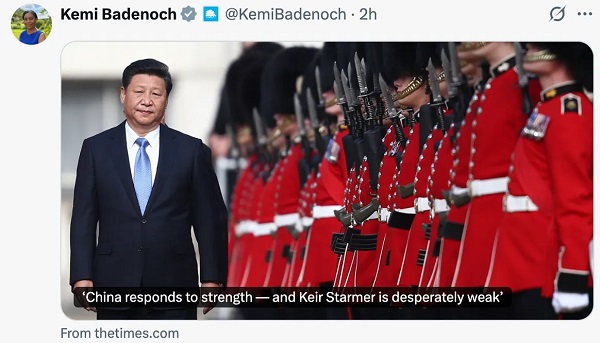Business
Even CBC’s friends are big mad about the big bonuses

From the Canadian Taxpayers Federation
Author: Kris Sims
This even weirder than the Masters of the Universe cartoon episode where the hero He-Man teamed up with the villain Skeletor to save Christmas.
The CBC doled out $18.4 million in bonuses. Meanwhile, the state broadcaster was also threatening to eliminate some positions just before Christmas. And that has even its “friends” upset.
A group called Friends of Canadian Media typically functions as a cheerleading squad for the CBC.
The group has praised the state broadcaster for years, comparing people who want it defunded to fans of professional wrestling – as if that’s a grave insult.
But this latest plot twist from the CBC even has its friends delivering a smack down.
In an email to supporters about the CBC bonuses, Friends of Canadian Media stated:
“This decision is deeply out of touch and unbefitting of our national public broadcaster.”
When it comes to these big bonuses, the CBC’s cheer team is now agreeing with the Canadian Taxpayers Federation that the bonuses are wrong.
Now, that’s where the agreement ends.
“CBC/Radio-Canada’s per capita funding currently sits at a 60-year low, thanks to decades of neglect from successive governments of all political stripes,” the group writes.
The CBC has “low funding” and is suffering from “neglect”?
The friends might want to lay off the kale smoothies for a bit because it sounds like they’re going fermented and that’s clouding their judgement.
The CBC’s government funding is astronomical and it gets an obscene amount of attention from our government, despite its ratings circling the drain.
The CBC’s taking $1.4 billion from taxpayers this year.
The money we spend on the CBC could pay the salaries of about 7,000 cops and 7,000 paramedics. It could buy more than 3,000 homes in Alberta. It would cover groceries for about 85,000 Canadian families for a year.
What the CBC costs taxpayers is the opposite of low funding.
The CBC has dished out $130 million in bonuses since 2015. There are 1,450 CBC staffers taking home six-figure salaries. Since 2015, the number of CBC employees taking a six-figure salary has soared by 231 per cent.
The Canadian Press reported that latest round of bonuses for executives at the CBC is more than $70,000 per person. That’s more than the average Canadian family takes home in a year.
The CEO of the CBC, Catherine Tait, is paid between $460,900 and $551,600 in salary per year. She’s also entitled to a bonus of up to 28 per cent. For the kids paying attention in math class, that’s a potential bonus of up to $154,448.
That’s a super weird form of low funding and neglect.
It’s got to be tough to land that woe-is-me message when millions get thrown around for bonuses.
Even a CBC news anchor asked her boss tough questions about the bonuses on national television.
“The Canadian Taxpayers Federation, through an FOI request, showed $16 million were paid in bonuses in 2022, can we establish that is not happening this year?” Adrienne Arsenault asked Tait on Dec. 4, 2023.
“I am not going to comment on something that hasn’t been discussed at this point,” Tait replied.
Turns out: those bonuses were in the works and now we know they’re costing taxpayers $18.4 million this year.
Meanwhile, Canadians are tuning out of the CBC while being forced to pay for it.
The CBC News Network’s share of the national prime-time viewing audience is 2.1 per cent, according to its latest third-quarter report.
Put another way, 97.9 per cent of TV-viewing Canadians choose not to watch CBC’s English language prime-time news program.
The CBC needs to be defunded. It’s a huge waste of money, a tiny handful of Canadians are tuning in and journalists should not be paid by the government. It’s a good bet the debate on that larger point will keep getting hotter.
But this part of the debate is down for the count: the outrageous CBC bonuses need to end.
When the Canadian Taxpayers Federation and Friends of Canadian Media agree on something, consensus has been achieved and the fight’s over.
Kris Sims is the Alberta Director for the Canadian Taxpayers Federation and a former member of the Parliamentary Press Gallery.
Business
US government buys stakes in two Canadian mining companies

From the Fraser Institute
Prime Minister Mark Carney recently visited the White House for meetings with President Donald Trump. In front of the cameras, the mood was congenial, with both men complimenting each other and promising future cooperation in several areas despite the looming threat of Trump tariffs.
But in the last two weeks, in an effort to secure U.S. access to key critical minerals, the Trump administration has purchased sizable stakes in in two Canadian mining companies—Trilogy Metals and Lithium Americas Corp (LAC). And these aggressive moves by Washington have created a dilemma for Ottawa.
Since news broke of the investments, the Carney government has been quiet, stating only it “welcomes foreign direct investment that benefits Canada’s economy. As part of this process, reviews of foreign investments in critical minerals will be conducted in the best interests of Canadians.”
In the case of LAC, lithium is included in Ottawa’s list of critical minerals that are “essential to Canada’s economic or national security.” And the Investment Canada Act (ICA) requires the government to scrutinize all foreign investments by state-owned investors on national security grounds. Indeed, the ICA specifically notes the potential impact of an investment on critical minerals and critical mineral supply chains.
But since the lithium will be mined and processed in Nevada and presumably utilized in the United States, the Trump administration’s investment will likely have little impact on Canada’s critical mineral supply chain. But here’s the problem. If the Carney government initiates a review, it may enrage Trump at a critical moment in the bilateral relationship, particularly as both governments prepare to renegotiate the Canada-U.S.-Mexico Agreement (CUSMA).
A second dilemma is whether the Carney government should apply the ICA’s “net benefits” test, which measures the investment’s impact on employment, innovation, productivity and economic activity in Canada. The investment must also comport with Canada’s industrial, economic and cultural policies.
Here, the Trump administration’s investment in LAC will likely fail the ICA test, since the main benefit to Canada is that Canadian investors in LAC have been substantially enriched by the U.S. government’s initiative (a week before the Trump administration announced the investment, LAC’s shares were trading at around US$3; two days after the announcement, the shares were trading at US$8.50). And despite any arguments to the contrary, the ICA has never viewed capital gains by Canadian investors as a benefit to Canada.
Similarly, the shares of Trilogy Minerals surged some 200 per cent after the Trump administration announced its investment to support Trilogy’s mineral exploration in Alaska. Again, Canadian shareholders benefited, yet according to the ICA’s current net benefits test, that’s irrelevant.
But in reality, inflows of foreign capital augment domestic savings, which, in turn, provide financing for domestic business investment in Canada. And the prospect of realizing capital gains from acquisitions made by foreign investors encourages startup Canadian companies.
So, what should the Carney government do?
In short, it should revise the ICA so that national security grounds are the sole basis for approving or rejecting investments by foreign governments in Canadian companies. This may still not sit well in Washington, but the prospect of retaliation by the Trump administration should not prevent Canada from applying its sovereign laws. However, the Carney government should eliminate the net benefits test, or at least recognize that foreign investments that enrich Canadian shareholders convey benefits to Canada.
These recent investments by the Trump administration may not be unique. There are hundreds of Canadian-owned mining companies operating in the U.S. and in other jurisdictions, and future investments in some of those companies by the U.S. or other foreign governments are quite possible. Going forward, Canada’s review process should be robust while recognizing all the benefits of foreign investment.
Business
Over two thirds of Canadians say Ottawa should reduce size of federal bureaucracy

From the Fraser Institute
By Matthew Lau
From 2015 to 2024, headcount at Natural Resources Canada increased 39 per cent even though employment in Canada’s natural resources sector actually fell one per cent. Similarly, there was 382 per cent headcount growth at the federal department for Women and Gender Equality—obviously far higher than the actual growth in Canada’s female population.
According to a recent poll, there’s widespread support among Canadians for reducing the size of the federal bureaucracy. The support extends across the political spectrum. Among the political right, 82.8 per cent agree to reduce the federal bureaucracy compared to only 5.8 per cent who disagree (with the balance neither agreeing nor disagreeing); among political moderates 68.4 per cent agree and only 10.0 per cent disagree; and among the political left 44.8 per cent agree and 26.3 per cent disagree.
Taken together, “67 per cent agreed the federal bureaucracy should be significantly reduced. Only 12 per cent disagreed.” These results shouldn’t be surprising. The federal bureaucracy is ripe for cuts. From 2015 to 2024, the federal government added more than 110,000 new bureaucrats, a 43 per cent increase, which was nearly triple the rate of population growth.
This bureaucratic expansion was totally unjustified. From 2015 to 2024, headcount at Natural Resources Canada increased 39 per cent even though employment in Canada’s natural resources sector actually fell one per cent. Similarly, there was 382 per cent headcount growth at the federal department for Women and Gender Equality—obviously far higher than the actual growth in Canada’s female population. And there are many similar examples.
While in 2025 the number of federal public service jobs fell by three per cent, the cost of the federal bureaucracy actually increased as the number of fulltime equivalents, which accounts for whether those jobs were fulltime or part-time, went up. With the tax burden created by the federal bureaucracy rising so significantly in the past decade, it’s no wonder Canadians overwhelmingly support its reduction.
Another interesting poll result: “While 42 per cent of those surveyed supported the government using artificial intelligence tools to resolve bottlenecks in service delivery, 32 per cent opposed it, with 25 per cent on the fence.” The authors of the poll say the “plurality in favour is surprising, given the novelty of the technology.”
Yet if 67 per cent of Canadians agree with significantly shrinking the federal bureaucracy, then solid support for using AI to increasing efficiency should not be too surprising, even if the technology is relatively new. Separate research finds 58 per cent of Canadian workers say they use AI tools provided by their workplace, and although many of them do not necessarily use AI regularly, of those who report using AI the majority say it improves their productivity.
In fact, there’s massive potential for the government to leverage AI to increase efficiency and control labour expenses. According to a recent study by a think-tank at Toronto Metropolitan University (formerly known as Ryerson), while the federal public service and the overall Canadian workforce are similar in terms of the percentage of roles that could be made more productive by AI, federal employees were twice as likely (58 per cent versus 29 per cent) to have jobs “comprised of tasks that are more likely to be substituted or replaced” by AI.
The opportunity to improve public service efficiency and deliver massive savings to taxpayers is clearly there. However, whether the Carney government will take advantage of this opportunity is questionable. Unlike private businesses, which must continuously innovate and improve operational efficiency to compete in a free market, federal bureaucracies face no competition. As a result, there’s little pressure or incentive to reduce costs and increase efficiency, whether through AI or other process or organizational improvements.
In its upcoming budget and beyond, it would be a shame if the federal government does not, through AI or other changes, restrain the cost of its workforce. Taxpayers deserve, and clearly demand, a break from this ever-increasing burden.
-

 Alberta1 day ago
Alberta1 day agoClick here to help choose Alberta’s new licence plate design
-

 National1 day ago
National1 day agoDemocracy Watch Renews Push for Independent Prosecutor in SNC-Lavalin Case
-

 Business2 days ago
Business2 days agoOver two thirds of Canadians say Ottawa should reduce size of federal bureaucracy
-

 Media2 days ago
Media2 days agoCanada’s top Parliamentary reporters easily manipulated by the PMO’s “anonymous sources”
-

 Agriculture2 days ago
Agriculture2 days agoIs the CFIA a Rogue Agency or Just Taking Orders from a Rogue Federal Government?
-

 espionage2 days ago
espionage2 days ago“Suitcase of Cash” and Secret Meeting Deepen Britain’s Beijing Espionage Crisis
-

 Alberta1 day ago
Alberta1 day agoBusting five myths about the Alberta oil sands
-

 Frontier Centre for Public Policy1 day ago
Frontier Centre for Public Policy1 day agoOttawa Should Think Twice Before Taxing Churches







